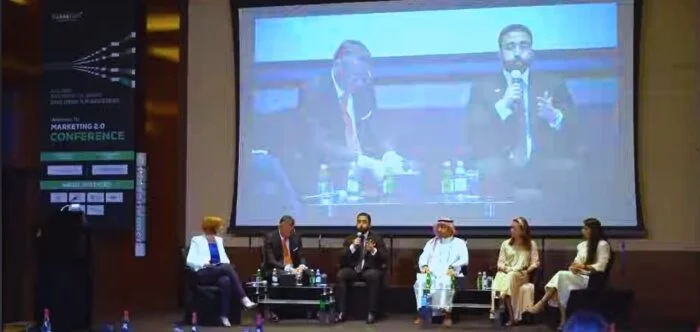Conferences are dynamic events with learning opportunities, networking, and engaging discussions. They are often powered by a dedicated team of volunteers who work tirelessly behind the scenes to ensure everything runs smoothly. A frequently asked question in this context is, “Do the volunteers get paid at a conference?”
Yes, there are instances where volunteers can receive compensation for their efforts, which might surprise many, considering the typical notion of unpaid volunteer work.
If you’re curious about the circumstances under which volunteers might be compensated and how this impacts the overall conference experience, continue reading our article. We delve deeper into this intriguing aspect of conference management, providing insights that volunteers and organizers will find valuable.
Who are the Volunteers at a Conference?
Conference volunteers are dedicated individuals who assist organizers with managing various tasks that keep events organized and running smoothly. They help with attendee check-ins, distribute materials, guide participants, and provide essential support during different sessions. Many conferences, including conferences in Canada, the USA, Australia, Dubai etc. rely on volunteers to improve attendee experiences by offering friendly assistance. Their contributions help reduce workload pressures, allowing event coordinators to focus on delivering high-quality sessions and seamless logistics.

Most volunteers are students, young professionals, or industry enthusiasts eager to gain experience and expand their professional networks. They benefit from valuable learning opportunities, direct interactions with experts, and behind-the-scenes insights into event management. In addition to supporting logistics, they ensure attendees feel comfortable, informed, and engaged throughout the conference. Volunteering at events builds skills and opens doors to future career opportunities and meaningful professional connections.
Roles of a Volunteer at the Conference
Conference volunteers play pivotal roles, ensuring these events run seamlessly and efficiently. Their responsibilities are diverse, catering to various aspects of event management. From technical support to guest relations, their contribution is invaluable.
- Registration Desk Assistance: Volunteers at the registration desk warmly welcome attendees, providing badges and event materials. They are the first point of contact, setting the event’s tone with their hospitality.
- Session Coordination: These volunteers manage the logistics of each session, ensuring speakers and presentations adhere to the schedule. Their role is essential for the smooth transition between different conference segments.
- Technical Support: Handling audio-visual equipment and addressing technical glitches, these volunteers ensure presentations run without hitches. They are the unsung heroes who manage the technical aspects behind the scenes.
- Information and Guidance: Positioned at major locations, these volunteers provide directions and information, helping attendees guide the venue. Their knowledge and assistance enhance the overall experience of the participants.
- Networking Facilitators: Often at social events, volunteers encourage networking, introducing attendees to one another. They play a major role in promoting professional connections and interactions.
The multifaceted roles of volunteers at conferences are significant for the event’s success. Their dedication and hard work facilitated the conference’s smooth functioning and enhanced the overall experience for attendees and organizers alike.
Do the Volunteers Get Paid at a Conference?
Yes, in some cases, volunteers at conferences do receive payment. This compensation is only standard across some events, but it’s becoming increasingly common in specific conferences. The decision to pay volunteers usually depends on various factors, each playing a significant role in determining the nature of the compensation. Here are the factors involved in the decision:
Nature of the Conference
- Large-scale conferences with substantial budgets may offer financial compensation to volunteers.
- These events often require more professional skills to justify the payment.
- However, smaller, community-driven conferences might rely solely on volunteerism.
- The decision to pay often reflects the conference’s size, funding, and organizational structure.
Type of Work Involved
- Complex tasks requiring specific skills warrant payment for volunteers.
- It includes roles like technical support, specialized coordination, or guest speaking.
- Simple tasks, like ushering or registration, usually remain unpaid.
- Payment for skilled work helps attract qualified individuals, ensuring event quality.
Duration of the Conference
- Multi-day events might offer compensation, considering the extended time commitment.
- Shorter conferences, typically spanning a day, might not provide financial rewards.
- Volunteers dedicating several days are more likely to receive payment or other benefits.
- The longer the commitment, the higher the likelihood of compensation.
Budget and Funding Sources
- Conferences with substantial sponsorship or high registration fees might have budgets for paying volunteers.
- Events dependent on grants or donations might need more funds to pay.
- The financial structure and funding sources greatly influence the payment decision.
- Financially robust conferences are more capable of offering compensation.
Whether volunteers get paid at a conference is influenced by various factors like the event’s scale, the nature of work, the duration of the conference, and its financial structure. Each of these elements contributes to the decision-making process regarding volunteer compensation.
Reasons for Volunteering at a Conference
Volunteering at a conference offers unique opportunities for individuals looking to contribute meaningfully. Volunteers perform a variety of tasks, enriching their experience and the event’s success. Their diverse roles are major in facilitating smooth operations and vibrant interactions.
Professional Networking
Volunteering offers an unparalleled platform for networking with professionals and industry leaders. It opens doors to potential career opportunities and collaborations. Interacting with experts provides insights into industry trends and practices. This exposure can significantly enhance a volunteer’s professional network and career prospects.
Skill Development
Conferences provide a practical setting for volunteers to hone existing and acquire new skills. Tasks like event coordination or technical support require and develop multiple competencies. Such experiences are valuable additions to a resume, showcasing a proactive learning attitude. Volunteers often gain hands-on experience in communication, leadership, and problem-solving.
Access to Learning Opportunities
Volunteers typically get free or discounted access to the conference, including keynotes and workshops. This access allows them to learn from presentations and discussions they otherwise might not afford. They gain knowledge about the latest developments and research in their field. Such learning opportunities are especially beneficial for students and early-career professionals.
Personal Satisfaction
Many volunteers find intrinsic value in contributing to the success of an event. Seeing a conference run smoothly due to one’s efforts is a sense of achievement. Volunteering creates a sense of community and belonging, which is personally fulfilling. Helping others and supporting educational initiatives can be a rewarding experience in itself.
Volunteering at a conference is a decision driven by diverse motivations, including professional networking, skill development, access to learning opportunities, and personal satisfaction. Each of these reasons contributes to the volunteers’ individual growth and the overall success and vibrancy of the conference they serve.
Tips to Help You Find the Right Conference to Volunteer
Choosing the right conference to volunteer at can significantly enhance your experience and benefits. It’s important to select an event that aligns with your interests and goals. Here are some tips to guide you in finding a conference that matches your needs and aspirations:
- Identify Your Interests: Look for conferences that align with your personal or professional interests. Engaging in topics you’re passionate about makes the volunteering experience more enjoyable and fulfilling.
- Research the Event’s Reputation: Investigate the conference’s history and feedback from past events. A credible conference focused on volunteers can offer more valuable networking opportunities and learning experiences.
- Consider the Size and Scale: Determine if you prefer a large-scale international event or a smaller, more intimate gathering. The size of the conference can greatly affect the nature of your volunteering duties and experiences.
- Evaluate the Location: Consider the logistical aspects, such as travel and accommodation. A conveniently located conference can reduce expenses and make your participation more feasible.
- Assess Skill Development Opportunities: Choose a conference that offers the chance to develop specific skills you’re interested in. This could be technical skills, event management, or networking.
- Check for Perks and Benefits: Some conferences offer benefits to volunteers like free access to sessions, meals, or even stipends. These perks can make volunteering more appealing and cost-effective.
- Understand the Commitment Required: Ensure you’re aware of the time and effort required. Aligning this with your availability is fundamental to avoid any conflicts and stress.
Finding the right conference to volunteer at involves a balance of personal interests, logistical considerations, and potential benefits. By thoroughly researching and considering these aspects, you can select a conference that not only benefits your career and skills but also provides an enriching and enjoyable experience.
Bottom Lines
As conference volunteering develops, the multifaceted nature of roles such as these becomes apparent, including the intriguing question of whether or not volunteers are paid.
Volunteers, essential to the seamless execution of these events, may receive compensation depending on factors like the conference’s scale, the intricacy of their tasks, and the overall budget. Personal and professional interests should inform the choice to volunteer, the event’s standing, and the potential for skill enhancement.
The right fit ensures access to opportunities for growth, networking, and personal fulfillment. Accurately aligning with a suitable conference is essential, as it enriches the volunteer’s experience and significantly contributes to the conference’s success, highlighting the indispensable value volunteers bring to these educational and professional gatherings.







